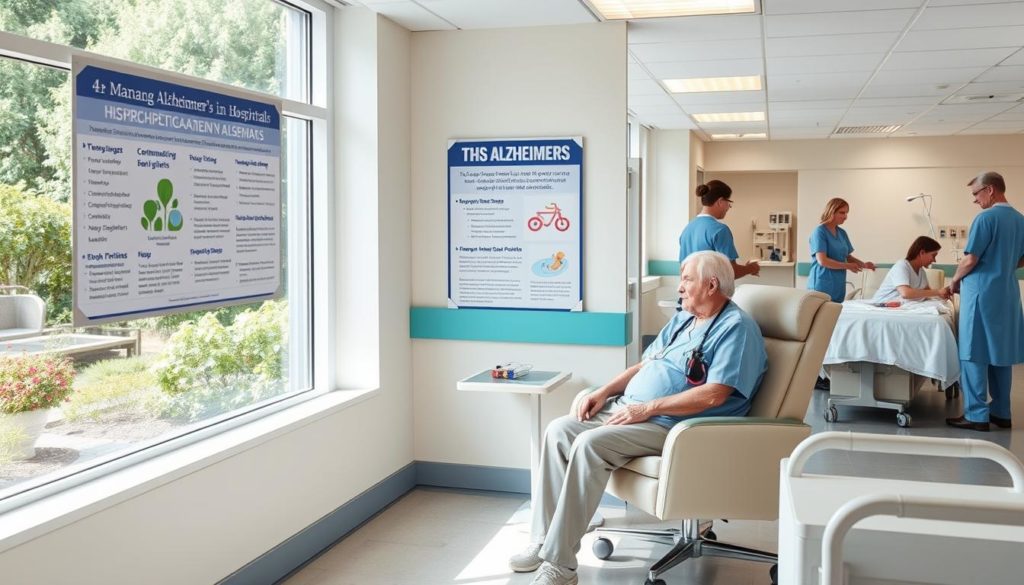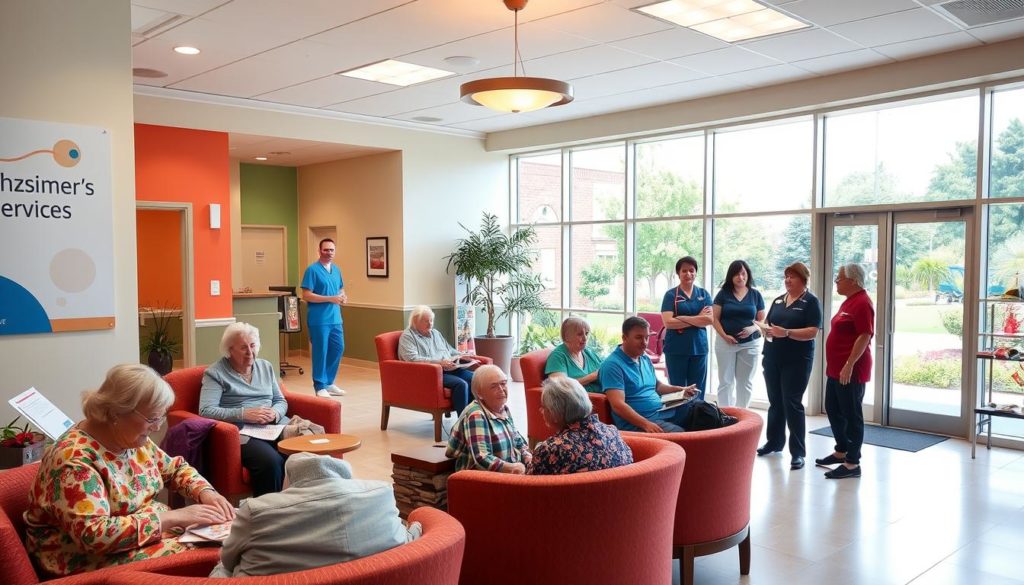Did you know about one-third of people with Alzheimer’s end up in the hospital each year? This fact highlights how crucial it is to understand hospital stays for Alzheimer’s care. Hospital visits can be especially trying for these patients and their loved ones.
Being prepared can really help ease the stress of unexpected hospital trips. It’s important to know why these hospitalizations happen. You should also have legal and medical documents organized and readily available. Having a strong support system can make tough times easier to handle.
Know the Reasons for Hospitalization
Getting hospitalized is common for those managing Alzheimer’s in hospitals. Knowing why these hospital stays happen is key for excellent care. This knowledge helps prevent too many hospital visits.

Common causes leading to hospital stays for Alzheimer’s patients
Many things can cause Alzheimer’s patients to end up in the hospital. These reasons include issues from the disease like severe upset or confusion, falling injuries, and sicknesses like pneumonia or urinary infections. They also encompass worsened chronic problems such as heart disease or diabetes. Understanding these causes aids in better care and reduces emergency trips to the hospital.
Medical assessments and their importance
Doctors’ evaluations are crucial for Alzheimer’s patient care. Regular, detailed check-ups ensure the care given fits the patient’s needs well. These exams often look at brain function, run blood tests, and do scans to see the patient’s overall health. This ensures they get the best care tailored to them.
Preparing for a Hospital Stay
Getting ready for a hospital visit for someone with Alzheimer’s requires planning. This planning can reduce stress and make the stay easier. Having the right documents and essentials is key.

Importance of advance directives and legal paperwork
One important step is to have advance directives and legal documents ready. These papers tell doctors the patient’s care wishes. It’s crucial to use Alzheimer’s care resources to get these documents sorted out.
Creating an emergency kit
An emergency kit is also essential for hospital visits. This kit should have:
- Current medications list
- Copies of advance directives
- Contact information for primary caregivers and Alzheimer’s support services
- Insurance details and identification documents
Gathering items for an emergency kit can be easier with Alzheimer’s care resources. Being prepared makes the hospital stay smoother for the patient and the family. It helps everyone involved.
Packing Essentials for the Hospital
When getting ready for a hospital visit, having everything needed is very important. This is especially true for someone with Alzheimer’s. Packing the right items helps make the visit easier for both the patient and those taking care of them.
Necessary documents and items to include in the hospital bag
First, pack all the hospital stay essentials. This includes:
- Insurance information
- Medical and medication histories
- Legal papers like power of attorney and advance directives
- Emergency contact info
These documents are very important. They help hospital staff give the best care. Keeping them in one spot is very helpful in emergencies.
Personal comfort items to bring
It’s also good to bring things that make the patient feel comfortable. Some helpful items are:
- Photos they love
- Their favorite blankets or pillows
- Personal care items such as a toothbrush, hairbrush, and slippers
Such items keep the patient feeling at home. Places that care for Alzheimer’s patients often say how crucial these personal items are. They help patients adjust to new surroundings.
Packing both essential documents and items for comfort is wise. It helps make the hospital stay smoother for the patient and the medical team.
Hospital Stays for Alzheimer’s
When looking at hospital treatment options for Alzheimer’s, the setting plays a big role in patient health. Staying in the hospital for Alzheimer’s care means facing unique issues. These include dealing with anxiety and feeling lost. Making the ward feel welcoming and familiar helps a lot.
Making a care plan with Alzheimer’s patient care in mind is key. This plan should meet the individual’s needs. Getting family and caregivers involved is also important. They provide comfort and reduce confusion.
Planning a hospital stay must tackle both medical and emotional needs. Look at this comparison of typical hospital treatment options for Alzheimer’s:
| Aspect | Considerations |
|---|---|
| Medical Care | Frequent monitoring by specialists, medication management |
| Emotional Support | Involvement of family, personalized therapy |
| Environment | Creating a familiar and supportive setting |
| Coordination of Care | Integrating services from different healthcare professionals |
By concentrating on Alzheimer’s patient care in hospitals, both caregivers and doctors can offer better support. This makes treatment for Alzheimer’s more effective and comforting.
Managing Agitation and Delirium
Hospital stays can be tough on Alzheimer’s patients. This often leads to more agitation and delirium. It’s key to quickly spot and handle these problems. This improves care a lot. Using Alzheimer’s care resources and special methods helps make patients feel better.
Recognizing Signs of Agitation and Delirium
Agitation and delirium show up in many ways. You might see more confusion, seeing things, and strange actions. Knowing these signs is important. This way, you can use the right help from Alzheimer’s care resources. Here’s what to look for:
- Can’t stay still, moving around a lot
- Getting upset or mad easily
- Not knowing where they are
- Seeing or believing things that aren’t real
- Not sleeping well or at different times
Preventive Measures to Reduce Confusion
To manage Alzheimer’s agitation better and cut down on delirium, try these steps. They really help:
- Having someone familiar around during the hospital stay makes things less scary.
- Keeping the same daily activities as much as you can brings comfort.
- Close by personal items, like photos or a favorite blanket, create a soothing space.
Spotting signs early and using these steps are key. They make caring for Alzheimer’s patients in hospitals much better.
Ensuring Proper Nutrition and Hydration
For Alzheimer’s patients in hospitals, getting the right food and drinks is essential. It helps their overall health and deals with symptoms. Caregivers and hospital teams need to watch and support good eating and drinking habits closely.
Monitoring Fluid Intake
Keeping an eye on how much Alzheimer’s patients drink each day is key. This stops them from getting dehydrated. By offering water often and foods like fruit, they can stay well-hydrated.
- Track daily fluid consumption.
- Provide hydrating snacks such as watermelon and cucumbers.
- Encourage regular drinking routines.
Tips for Encouraging Proper Nutrition
Feeding Alzheimer’s patients in hospitals needs special attention. Eating small meals that are full of nutrients helps. Keeping mealtimes happy and relaxed also makes eating easier.
- Offer small, frequent meals.
- Ensure meals are rich in essential nutrients.
- Create a calm and pleasant dining atmosphere.
Here’s a quick look at the benefits:
| Aspect | Benefits |
|---|---|
| Monitoring Fluid Intake | Prevents dehydration, supports cognitive function |
| Proper Nutrition | Maintains physical health, improves mood and energy |
Preventing Infections and Promoting Comfort
Keeping Alzheimer’s patients safe from infections during hospital stays is vital. They are at risk for pneumonia and UTIs because their immune systems are not strong. It’s important for caregivers and healthcare workers to be alert to protect them.
It’s also key to make sure Alzheimer’s patients are comfortable in the hospital. Moving them around regularly can help avoid bedsores and improve blood flow. Keeping their space clean helps in preventing infections and makes them feel safe and comfortable.
| Priority | Action | Benefit |
|---|---|---|
| 1 | Regular Hand Hygiene | Reduces risk of infections |
| 2 | Frequent Repositioning | Prevents bedsores and improves comfort |
| 3 | Clean Environment | Minimizes exposure to pathogens |
| 4 | Hydration and Nutrition Monitoring | Supports overall health and immunity |
Addressing Pain and Discomfort
Dealing with pain in Alzheimer’s patients needs a careful approach. This is because they often find it hard to communicate. Caregivers have to watch for non-verbal signals and symptom changes to help them effectively. Managing their pain might include medications or trying things like massage and smells.
Understanding how Alzheimer’s patients show pain is key. Look for their facial expressions, how they move, or behavior changes. These signs help in giving the right comfort care.
To stay ahead, keeping a record of pain can help. It shows which treatments work best. Using non-drug methods can boost their comfort too. Simple things like a soft touch, warm baths, and having familiar items nearby can ease their pain.
In tough cases, talk with doctors to review the pain plan. Since each person’s pain level and treatment response differs, customized care plans are key. By closely watching and using both medical and non-medical ways, caregivers can provide the best comfort to their loved ones.
Wandering and Safety Precautions
Wandering is a big worry for Alzheimer’s patients in hospitals. Taking the right safety steps can greatly lower this risk. It helps keep patients safe. Let’s look at some good strategies.
Strategies to Prevent Wandering
To stop wandering, planning and using the right tools is key. Here are some methods that work:
- Electronic Tracking Tags: These are attached to patients’ clothes or wristbands. They let caregivers know where the patient is at all times.
- Clear Environment Labeling: Signs in rooms and hallways make it easier for patients to find their way.
- Presence of Familiar Individuals: Having someone they know around can make patients feel calmer. It also makes them less likely to wander.
Importance of Monitoring Movement
It’s vital to keep an eye on Alzheimer’s patients’ movements. Here’s how it can be done:
- Regular Check-ins: Hospital staff should check on patients regularly. This helps ensure they are okay.
- Adaptive Alarms: Alarms on doors or next to the bed can alert staff if a patient tries to leave.
- Video Surveillance: Cameras in key places provide extra monitoring. They help staff respond quickly if a patient wanders.
| Strategy | Purpose |
|---|---|
| Electronic Tracking Tags | Provide real-time location updates |
| Clear Environment Labeling | Help patients navigate the hospital |
| Presence of Familiar Individuals | Reduce anxiety and likelihood of wandering |
| Regular Check-ins | Ensure patient well-being |
| Adaptive Alarms | Notify staff of potential wandering |
| Video Surveillance | Offer additional oversight in critical areas |
Using these strategies and always monitoring patients can stop wandering. Being proactive is key. It keeps Alzheimer’s patients safe and comfy in the hospital.
Effective Communication with Hospital Staff
Effective communication is crucial for Alzheimer’s patients’ quality care during hospital stays. Using Alzheimer’s communication tactics and working with health care staff can greatly improve patient outcomes and their experiences.
Tips for Improving Communication with Medical Professionals
Getting better at talking with medical professionals takes preparation and being consistent. Here are some useful tips:
- Designate a Primary Contact: Choose a main contact person to make communication smoother. This ensures all news is shared correctly.
- Daily Care Plan Discussions: Talk daily with the medical team about the patient’s care plan. This keeps you updated and ready for changes.
- Document Everything: Keep a record of every talk, medication change, and treatment update. This helps keep track of everything for future reference.
Providing Key Information About the Patient
Hospitals need complete details on the patient’s needs for the best care. Working with health care workers means giving them vital information about the patient:
| Key Information | Details to Share |
|---|---|
| Medical History | Past illnesses, surgeries, and current meds. |
| Daily Routine | Usual sleep and eating habits. |
| Behavioral Triggers | Things that might upset or confuse them. |
| Comfort Preferences | Likes and dislikes that comfort the patient. |
By carefully following Alzheimer’s communication plans and working with health staff, caregivers can make sure Alzheimer’s patients get the most effective, personalized care in hospitals.
Planning for Discharge
Transitioning from hospital care to post-hospital care for Alzheimer’s needs careful planning. This ensures a smooth discharge. It covers everything from medication changes to scheduling follow-up visits.
Coordinating Post-Hospital Care
Coordinating care after the hospital is vital for those with Alzheimer’s. It requires working with healthcare professionals and going over the discharge plan. It’s also important to make sure the patient gets their medications and that caregivers understand any new care needs.
Options for Rehabilitation and In-Home Care
Choosing the best care setting is crucial for recovery. *Alzheimer’s rehabilitation services* provide specialized support. On the other hand, in-home care gives flexibility and the comfort of being at home. This allows for care that’s tailored to the patient’s needs.
Follow-Up Appointments and New Care Routines
Quickly scheduling follow-up visits is key to dealing with any problems after leaving the hospital. Creating new care routines that fit the patient’s current health is critical. Caregivers need to know the schedule for medications, physical therapy, and health checks.
Here is a comparative overview of different post-hospital care arrangements:
| Care Option | Advantages | Considerations |
|---|---|---|
| Rehabilitation Services | Specialized expertise, structured environment | May require travel, higher costs |
| In-Home Care | Comfort of home, personalized care | Dependent on caregiver availability, potential for limited resources |
| Outpatient Services | Regular professional monitoring, maintains social interaction | Frequent travel, coordination required |
Self-Care for Caregivers
Being a caregiver for someone with Alzheimer’s is deeply rewarding and challenging. The role’s demands can lead to burnout, making support crucial. Self-care is key to keeping up your health.
Start by noticing when you’re stressed. Take steps like making time for yourself, setting achievable goals, or finding help. Knowing when to seek help is important. For more tips, visit this valuable resource.
Having a strong support network helps share the caregiving burden. Remember, taking care of yourself is a must, not a luxury. This balance keeps you ready to provide the best care for your loved one.
FAQ
Why might an Alzheimer’s patient need hospitalization?
Alzheimer’s patients might go to the hospital for urgent health issues, problems from the disease, or other treatments. They need special care and attention for their health and happiness.
What are some common causes leading to hospital stays for Alzheimer’s patients?
Common reasons include urgent health problems like infections or falls, and severe pain. Issues directly from Alzheimer’s, such as confusion or agitation, also lead to hospital stays.
Why are medical assessments important for Alzheimer’s patients in hospitals?
Medical assessments find the health needs of Alzheimer’s patients. This ensures they get the right care. The care goes beyond the main reason for their hospital visit.
How can caregivers prepare for a hospital stay?
Caregivers should get legal paperwork ready and make an emergency kit. The kit should have current medicines and contact info. They also need to know about the hospital stay.
What documents and items should be included in the hospital bag?
The bag should have insurance and medical histories, legal documents, and contact info. Adding personal items like pictures and blankets can comfort the patient.
How can agitation and delirium be managed during a hospital stay?
Notice signs like confusion and different behavior first. Help by having a loved one nearby, keeping routines, and having personal items close.
Why is monitoring nutrition and hydration crucial for Alzheimer’s patients in hospitals?
Good nutrition and staying hydrated keep patients healthy. Caregivers and staff must watch what patients eat and drink closely to make sure they get what they need.
What infections are Alzheimer’s patients at risk for during hospital stays, and how can they be prevented?
Patients can get infections like pneumonia and UTIs. To prevent these, caregivers and staff must be very careful, change the patient’s position often, and keep everything clean.
How can pain and discomfort be addressed in Alzheimer’s patients who have difficulty communicating?
Watch for signs like restlessness or faces that show discomfort. Caregivers can use pain medicine or other ways to help, like massage or smells that are soothing.
What strategies can prevent wandering in a hospital setting for Alzheimer’s patients?
Use tracking devices, make the hospital easy to navigate, and have familiar people around. This keeps patients safe and prevents them from getting lost.
How can effective communication with hospital staff be ensured?
Pick someone to talk to the staff, have daily care plan talks, and share detailed info about the patient’s likes and needs for the right care.
What are some tips for coordinating care after hospital discharge?
Make a smooth plan for leaving the hospital. Understand medicine changes and look into home care or rehab. Set up a care routine for ongoing needs.
What self-care strategies can help Alzheimer’s caregivers prevent burnout?
Caregivers need to take care of themselves, ask for help, and have a support group. It’s important to stay well to take good care of their loved one.


